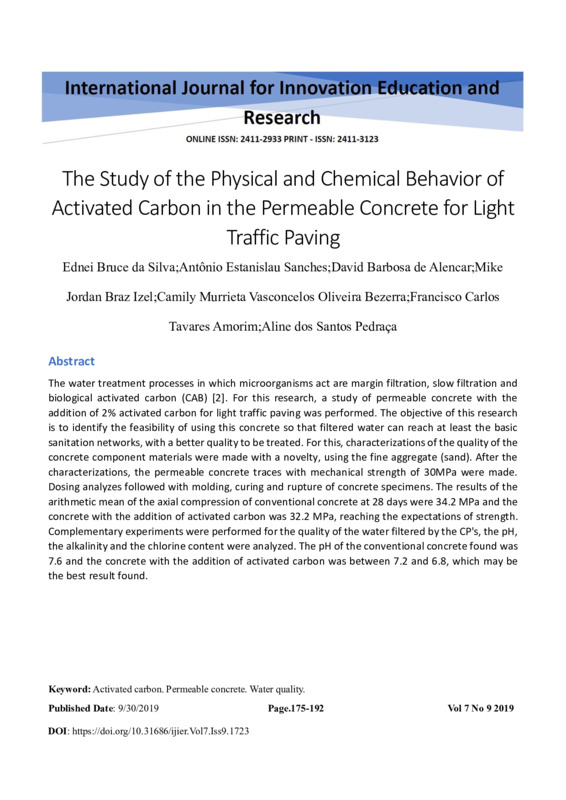The Study of the Physical and Chemical Behavior of Activated Carbon in the Permeable Concrete for Light Traffic Paving
Item
-
Tipo do ITEM
-
Artigo Ciêntifico
-
Título do Artigo
-
The Study of the Physical and Chemical Behavior of Activated Carbon in the Permeable Concrete for Light Traffic Paving
-
Descrição
-
Abstract
The water treatment processes in which microorganisms act are margin filtration, slow filtration and
biological activated carbon (CAB) [2]. For this research, a study of permeable concrete with the
addition of 2% activated carbon for light traffic paving was performed. The objective of this research
is to identify the feasibility of using this concrete so that filtered water can reach at least the basic
sanitation networks, with a better quality to be treated. For this, characterizations of the quality of the
concrete component materials were made with a novelty, using the fine aggregate (sand). After the
characterizations, the permeable concrete traces with mechanical strength of 30MPa were made.
Dosing analyzes followed with molding, curing and rupture of concrete specimens. The results of the
arithmetic mean of the axial compression of conventional concrete at 28 days were 34.2 MPa and the
concrete with the addition of activated carbon was 32.2 MPa, reaching the expectations of strength.
Complementary experiments were performed for the quality of the water filtered by the CP's, the pH,
the alkalinity and the chlorine content were analyzed. The pH of the conventional concrete found was
7.6 and the concrete with the addition of activated carbon was between 7.2 and 6.8, which may be
the best result found
Keyword: Activated carbon. Permeable concrete. Water quality.
-
Abstract
-
Abstract
The water treatment processes in which microorganisms act are margin filtration, slow filtration and
biological activated carbon (CAB) [2]. For this research, a study of permeable concrete with the
addition of 2% activated carbon for light traffic paving was performed. The objective of this research
is to identify the feasibility of using this concrete so that filtered water can reach at least the basic
sanitation networks, with a better quality to be treated. For this, characterizations of the quality of the
concrete component materials were made with a novelty, using the fine aggregate (sand). After the
characterizations, the permeable concrete traces with mechanical strength of 30MPa were made.
Dosing analyzes followed with molding, curing and rupture of concrete specimens. The results of the
arithmetic mean of the axial compression of conventional concrete at 28 days were 34.2 MPa and the
concrete with the addition of activated carbon was 32.2 MPa, reaching the expectations of strength.
Complementary experiments were performed for the quality of the water filtered by the CP's, the pH,
the alkalinity and the chlorine content were analyzed. The pH of the conventional concrete found was
7.6 and the concrete with the addition of activated carbon was between 7.2 and 6.8, which may be
the best result found
Keyword: Activated carbon. Permeable concrete. Water quality.
-
Língua do arquivo
-
inglês
-
Data da Publicação
-
Ano 2019
-
Palavra-chave
-
Activated carbon
-
Permeable concrete
-
Water quality.
-
Autores
-
Ednei Bruce da Silva
-
Antônio Estanislau Sanches
-
David Barbosa de Alencar
-
Mike Jordan Braz Izel
-
Camily Murrieta Vasconcelos Oliveira Bezerra
-
Francisco Carlos Tavares Amorim
-
Aline dos Santos Pedraça
-
Local
-
ITEGAM - Manaus, 2019


